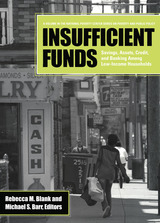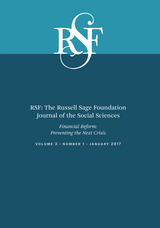2 books by Barr, Michael S.

Insufficient Funds
Savings, Assets, Credit, and Banking Among Low-Income Households
Rebecca M. Blank
Russell Sage Foundation, 2009
One in four American adults doesn’t have a bank account. Low-income families lack access to many of the basic financial services middle-class families take for granted and are particularly susceptible to financial emergencies, unemployment, loss of a home, and uninsured medical problems. Insufficient Funds explores how institutional constraints and individual decisions combine to produce this striking disparity and recommends policies to help alleviate the problem. Mainstream financial services are both less available and more expensive for low-income households. High fees, minimum-balance policies, and the relative scarcity of banks in poor neighborhoods are key factors. Michael Barr reports the results of an in-depth study of financial behavior in 1,000 low- and moderate-income families in metropolitan Detroit. He finds that most poor households have bank accounts, but combine use of mainstream services with alternative options such as money orders, pawnshops, and payday lenders. Barr suggests that a tax credit for banks serving primarily disadvantaged customers could facilitate greater equality in the private financial sector. Drawing on evidence from behavioral economics, Sendhil Mullainathan and Eldar Shafir show that low-income individuals exhibit many of the same patterns and weaknesses in financial decision making as middle-class individuals and could benefit from many of the same financial aids. They argue that savings programs that automatically enroll participants and require them to actively opt out in order to leave the program could drastically increase savings ability. Ronald Mann demonstrates that significant changes in the credit market over the past fifteen years have allowed companies to expand credit to a larger share of low-income families. Mann calls for regulations on credit card companies that would require greater disclosure of actual interest rates and fees. Raphael Bostic and Kwan Lee find that while home ownership has risen dramatically over the past twenty years, elevated risks for low-income families—such as foreclosure—may well outweigh the benefits of owning a home. The authors ultimately argue that if we want to demand financial responsibility from low-income households, we have an obligation to assure that these families have access to the banking, credit, and savings institutions that are readily available to higher-income families. Insufficient Funds highlights where and how access is blocked and shows how government policy and individual decisions could combine to eliminate many of these barriers in the future.
[more]

RSF
The Russell Sage Foundation Journal of the Social Sciences: Financial Reform: Preventing the Next Crisis
Michael S. Barr
Russell Sage Foundation, 2017
The 2008 financial crash and the ensuing Great Recession resulted from decades of unconstrained excess and failures of risk management on Wall Street and complacency in Washington. While the 2010 Dodd-Frank Act sought to curtail these abuses, more work remains to be done. This issue of RSF, edited by Michael S. Barr, sets out proposals for comprehensive financial reform. Contributors suggest how to improve financial regulation, make markets more resilient, and increase protections for consumers and investors in order to lower the likelihood of a future crisis.
Several contributors evaluate the Dodd-Frank bill which mandated greater federal oversight of banks, increased regulation of credit rating agencies, and established the Consumer Financial Protection Bureau (CFPB), among other measures. Martin Baily and coauthors conclude that measures that require greater transparency and oversight in derivatives transactions have made financial institutions more resilient. Yet, the bill’s attempts to consolidate the fragmented financial regulatory system have not gone far enough.
Lauren Willis argues that instead of simply issuing disclosures, financial service providers should be required to meet more rigorous performance standards, such as proving through third-party testing that customers understand their fees and surcharges. John Macey advocates reforms that would afford home mortgage borrowers the same protections as investors in the securities market, including regulations that prevent brokers from encouraging borrowers to refinance their mortgages to collect fees.
The issue also addresses global financial regulation. Viral Achara examines the financial sectors in the U.S., Europe, and Asia, and assesses their vulnerability to capital shortfalls in the event of a future crisis. Niamh Moloney finds that institutions established in the wake of the crash, such as the European Supervisory Authorities, have improved European-level prudential and consumer financial regulations and have the potential to increase the EU’s influence in international financial governance.
The effects of the financial crisis continue to reverberate around the world today. Together, the articles in this issue document the steps necessary for creating a more robust financial system that works better for all consumers, investors and the financial system itself.
Several contributors evaluate the Dodd-Frank bill which mandated greater federal oversight of banks, increased regulation of credit rating agencies, and established the Consumer Financial Protection Bureau (CFPB), among other measures. Martin Baily and coauthors conclude that measures that require greater transparency and oversight in derivatives transactions have made financial institutions more resilient. Yet, the bill’s attempts to consolidate the fragmented financial regulatory system have not gone far enough.
Lauren Willis argues that instead of simply issuing disclosures, financial service providers should be required to meet more rigorous performance standards, such as proving through third-party testing that customers understand their fees and surcharges. John Macey advocates reforms that would afford home mortgage borrowers the same protections as investors in the securities market, including regulations that prevent brokers from encouraging borrowers to refinance their mortgages to collect fees.
The issue also addresses global financial regulation. Viral Achara examines the financial sectors in the U.S., Europe, and Asia, and assesses their vulnerability to capital shortfalls in the event of a future crisis. Niamh Moloney finds that institutions established in the wake of the crash, such as the European Supervisory Authorities, have improved European-level prudential and consumer financial regulations and have the potential to increase the EU’s influence in international financial governance.
The effects of the financial crisis continue to reverberate around the world today. Together, the articles in this issue document the steps necessary for creating a more robust financial system that works better for all consumers, investors and the financial system itself.
[more]
READERS
Browse our collection.
PUBLISHERS
See BiblioVault's publisher services.
STUDENT SERVICES
Files for college accessibility offices.
UChicago Accessibility Resources
home | accessibility | search | about | contact us
BiblioVault ® 2001 - 2024
The University of Chicago Press









